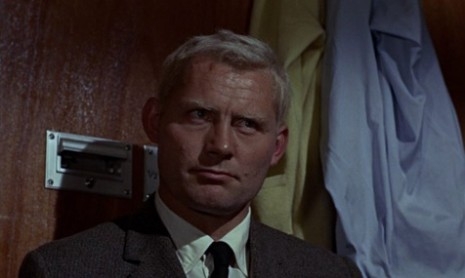
Sean Connery once remarked that From Russia With Love was his favourite Bond film, as it depended more on story and character than gadgets and special effects.
This is true but the film also had a great title song, sung by the incomparable Matt Monro, and outstanding performances from Robert Shaw and Lotte Lenya in its favour.
By the time of making From Russia With Love, Lotte Lenya was a celebrated singer and actress, known for her pioneering performances in, husband, Kurt Weill’s and Bertolt Brecht’s Mahagonny-Songspiel (1927) and the legendary Threepenny Opera (1928).
In From Russia With Love, Lenya played Rosa Klebb, a sadistic former SMERSH Agent who has joined SPECTRE to become Ernst Blofeld’s No. 3. You can uess what happened to 1 and 2. The name Rosa Klebb was a pun contrived by Bond author Ian Fleming, derived from the Soviet phrase for women’s rights, ‘khleb i rozy’, which is a Russian translation for ‘bread and roses’. Lenya’s perfromance as the sadistic Klebb is one of the most iconic of all Bond villains, with her poisoned tipped dagger, secreted in the toe of her shoe.
Lenya’s Klebb often overshadows Robert Shaw’s underplayed, though equally efficient Donald ‘Red’ Grant. Shaw was a highly talented man whose own personal tragedies (his father a manic depressive and alcoholic committed suicide when Robert was 12) and alcoholism hampered him from rightly claiming his position as one of Britain’s greatest actors.
Shaw established himself through years of TV and theatrical work, most notably his chilling and subtle performance as Aston in Harold Pinter‘s The Caretaker. He went on to throw hand grenades in The Battle of the Bulge (1965), and gave a deservedly Oscar-nominated performance as Henry VIII in A Man For All Seasons (1966). He delivered excellent performances in Young Winston, and, as the mobster Doyle Lonnegan, in The Sting (1973), then gave two of his most iconic roles, the quietly calculating and menacing Mr Blue in The Taking of Pelham One Two Three (1974) and a scenery chewing Quint in Jaws (1975).
But Shaw’s success as an actor was countered by further personal tragedy when his second wife, Mary Ure, who had followed Shaw into alcoholism, died from an accidental overdose. Ure’s death caused Shaw considerable guilt and despair, and led the actor to become severely depressed and reclusive in his personal life.
Shaw countered this by continuing his career as a respected and award-winning novelist and playwright. His first novel The Hiding Place, was later adapted for the film, Situation Hopeless… But Not Serious (1965) starring Alec Guinness. His next, The Sun Doctor won the Hawthornden Prize. While for theatre he wrote a trilogy of plays, the centerpiece of which was his most controversial and successful drama, The Man in the Glass Booth (1967).
The Man in the Glass Booth dealt with the issues of identity, guilt and responsibility that owed much to the warped perceptions caused by Shaw’s alcoholism. Undoubtedly personal, the play however is in no way autobiographical, and was inspired by actual events surrounding the kidnapping and trial of Adolf Eichmann.
In Shaw’s version, a man believed to be a rich Jewish industrialist and Holocaust survivor, Arthur Goldman, is exposed as a Nazi war criminal. Goldman is kidnapped from his Manhattan home to stand trial in Israel. Kept in a glass booth to prevent his assassination, Goldman taunts his persecutors and their beliefs, questioning his own and their collective guilt, before symbolically accepting full responsibility for the Holocaust. At this point it is revealed Goldman has falsified his dental records and is not a Nazi war criminal, but is in fact a Holocaust survivor.
The original theatrical production was directed by Harold Pinter and starred Donald Pleasance in an award-winning performance that launched his Hollywood career. The play was later made into an Oscar nominated film directed by Arthur Hiller and starring Maximilian Schell. However, Shaw was unhappy with the production and asked for his name to be removed form the credits.
Looking back on the play and film now, one can intuit how much Shaw’s own personal life influenced the creation of one of theatre’s most controversial and tragic figures.
Bonus clips of Lotte Lenya singing ‘Pirate Jenny’ and Matt Monro after the jump…





